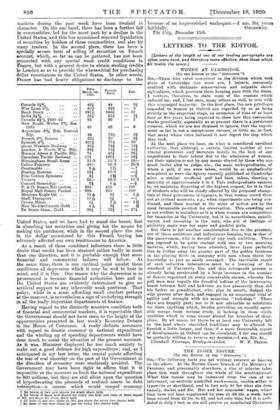LETTERS TO THE EDITOR.
[Letters of the length of one of our leading paragraphs are often more read, and therefore more eliective, than those which fill treble the space.]
WOMEN AT CAMBRIDGE.
(To THE EDITOR or THE "SPECTITOR."3
Sin,—Those who voted non-placet in the division which took place at Cambridge last week are, I believe, eommonly credited with obstinate conservatism and culpable short- sightedness, which prevents them keeping pace with the times. I venture, therefore, to state some of the reasons which induced me, and, I feel sure, many others as well, to vote with this misjudged majority. In the first place, the new privileges conceded to women at Oxford are regarded by us as being strictly in the empirical stage, an extension of time of at least four or five years being required to show how this concession works practically, especially as at present there is a persistent rumour, which we are not disposed to ignore, that the experi- ment so far is not a conspicuous success, so little so, in'fact, that many whose votes initiated it now regret the step which they took.
In the next place we hear, on what is considered excellent authority, that although a certain limited number of pro- vincial professors and lecturers testify to the lack of any impediment to their labour due to the admission of women, yet their opinion is not by any means shared by those who are much better able to judge, viz., the male undergraduates, of whom a poll, if one were taken, would be as emphatically non-placet as were the figures recently published at Cambridge after a similar unofficial poll had been taken, showing a majority of approximately 8 to 3. This undergraduate opinion is, we maintain, deserving of the highest respect, for it is that of students who will be chiefly affected by the proposed change. One of their grievances, it appears, is that women crowd them out at critical moments, e.g., when experiments are being con- ducted, and those nearest to the scene of action are in the most favourable position for observation. This crowding out is not evident to outsiders as it is when women are competitors for vacancies in the University, but it is, nevertheless, equally unjust and annoying to the men, who out of feelings of gallantry make way for eager and pushful girls.
But there is yet another consideration due to the presence, not of these ambitious and industrious females, but to that of the pass-woman, who is devoid of any such ambition. These are reputed to be quite content with one or two morning lectures, which, having been attended, leave them perfectly free to fritter away the greater part of the golden forenoon in the playing fields in company with men whose thirst for knowledge is just as easily assuaged. The inevitable result of such seductive intercourse must be a lowering of the standard of University life, and this retrograde process is already being accelerated by a large increase in the number of dances organized on every conceivable excuse, whereby the poll man may beguile the dreadful tedium of the intervening hours between hall and bed-time no less pleasantly than did his father or grandfather, who, pipe in mouth, dodged the wily proctor after dark, and engaged in an occasional trial of agility and strength with his muscular " bull-dogs." Those days are happily past; nor is it now advisable to substitute for them anything which, besides providing an equally agree- able escape from serious study, is lacking in those virile qualities which to some extent atoned for breaches of disci- pline. By all means let there be at least one University left in the land where cherished traditions may be allowed to flourish a little longer, and then, if a more favourable report of developments at Oxford can be circulated, I for one should be perfectly willing to reverse my decision.—I am, Sir, &c.,
Ullenhall Vicarage, Henley-in-Arden. W. F. FELTON.






































 Previous page
Previous page